Torchbearers: Difference between revisions
No edit summary |
No edit summary |
||
| Line 50: | Line 50: | ||
Following the defeat of the {{wp|Patrian People’s Republic}} in 1941, militants from the Lumenic-Notreceaun border region fleeing reprisals from their respective governments fled the former territory en-masse. Many of these former combatants ended up in territory controlled by the Soviet Order, and beginning in 1942 were organized into the 5th, 7th ([[Luminerra|Lumenic]]) 8th (all Patrian) and 9th ([[Notreceau|Notreceauen]]) brigades respectively. After a period of retraining and integration into the Soviet Order command structure these brigades, along with the 6th (Placeholder), entered combat operations beginning in 1943. | Following the defeat of the {{wp|Patrian People’s Republic}} in 1941, militants from the Lumenic-Notreceaun border region fleeing reprisals from their respective governments fled the former territory en-masse. Many of these former combatants ended up in territory controlled by the Soviet Order, and beginning in 1942 were organized into the 5th, 7th ([[Luminerra|Lumenic]]) 8th (all Patrian) and 9th ([[Notreceau|Notreceauen]]) brigades respectively. After a period of retraining and integration into the Soviet Order command structure these brigades, along with the 6th (Placeholder), entered combat operations beginning in 1943. | ||
Following the conclusion of the communist revolution in [[Abrahar]] in 1951, the newly formed Union of Soviet Socialist | Following the conclusion of the communist revolution in [[Abrahar]] in 1951, the newly formed Union of Soviet Socialist Kibbutzim began standing up volunteer brigades within [[Abrahar]] proper to join the Torchbearers. The 10th, 11th, 12th, 13th and 14th brigades respectively underwent training with aid and direction of Soviet Order officers and advisors throughout the period of 1951-1952, before eventually transiting to the Soviet Order proper in late 1952 and reaching the frontlines in early 1953. All five brigades began combat operations during the spring offensive of 1953, primarily in support of the 7th and 9th brigades during the invasion of (Placeholder). | ||
==Formations and recruitment== | ==Formations and recruitment== | ||
Revision as of 00:37, 24 September 2023
| Licanan Torchbearers (Vysokaya Rech': Fakelonostsy Nova Lumenic: Tedofori Notreceauen : Porteurs du Flambeau Abraharan: נושאי לפידים | |
|---|---|
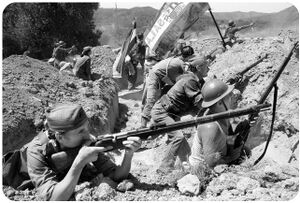 Members of the 2nd Torchbearers Brigade during the Patrian People's War of Liberation, which lasted from 1936 to 1941 in and around the area of Sable; what is now modern day Luminerra and southern Notreceau | |
| Country | Various |
| Type | Infantry |
| Role | Paramilitary |
| Colors | Red and Gold |
| Insignia | |
| Unit Flag (1931 - 1993) (2001 - present) |  |
| Shoulder sleeve insignia |  |
The Torchbearers is a military formation established by the Order of Soviet Socialist Republics as the military arm of the Cominform to defend the ideals of, advocate for and assist in spreading global communism across Annwynn. The formation varied in size and equipment, and recruited widely from friendly nations around the world, including drawing members from the Copperhad Republic, Union of Soviet Socialist Kibbutz and many others. Formations of the Torchbearers participated in combat operations and wars of liberation in many nations, including the Patrian People's War of Liberation (1936 - 1941), the Omandan Continental War and <others>
The Torchbearers effectively ceased to exist as a function as a coherent formation in the closing days of the Omandan Continental War, during which a large scale strategic nuclear exchange occurred between the Soviet Order, the Republic of Licana and other Allied nations against the Soviet Order's forces.
The organization was reestablished by the government of the Union of Soviet Socialist Kibbutz in 2001 and continues to function to this day.
History
Beginning in 1919, the strategic planning committee of the General Directorate of Military and Logistics of the Soviet Order began devising invasion plans for the continent of Omand. This plan, the most ambitious of its kind ever seen, broke the continent into a series of strata or belts, each to be invaded and pacified before proceeding to the next. Early on in the planning process the General Directorate realized the immense complications of such a sweeping multi-national operation and began taking steps to alleviate the cultural, linguistic, and terrain challenges of pacifying a disparate group of nations. In order to combat this, the first priority of the General Directorate was to gather a series of experts from the various nations in the first belt.
Recognizing that a mass hiring of terrain, linguistic, and cultural experts from its neighbors would likely raise alarm bells, the General Directorate instructed COMINFORM to conduct the “World Socialist Survey” in 1924. The WSS was, ostensibly, a gathering of the finest geological, linguistic, anthropological, sociological, industrial, and military minds from the member states and organizations of the COMINFORM gathered together within the Soviet Order to conduct the “first multinational census of worldwide socialism.” In reality, however, the Directorate began hiring components of these experts as advisors for what came to be known as “Operation Typhon,” or the first leg of the Omandan Continental war. Throughout the period of 1924-1931, it is believed that over 40,000 global academics from a variety of fields were employed by the Soviet Order.
In 1931, following the commencement of Operation Typhoon and the invasion of Gratislavia, many of these extra-national advisors were declared criminals in their home country and the Gratislav contingent specifically was stripped of their citizenship. In response, a proposal was submitted to the General Directorate of COMINFORM by the Gratislav exiles to form the “International Fighting Brigades for Socialist Freedom, Unity and Peace.” This proposal was well received in the Soviet Order as both a useful logistical and military apparatus as well as a propaganda tool, however after deliberation at the 31st annual World Congress of COMINFORM the name “Torchbearers” was approved by the General Assembly. The first Brigade was organized from a multitude of intellectuals from nations across the continent, whereas the second was comprised of multinational combat volunteers and the third “All-Gratislav” brigade was comprised primarily of combat volunteers from Gratislavia itself.
From this point on, the Torchbearers were placed under the command of the Ministry of Defense for purposes of combat operations, however, COMINFORM’s official control and influence in the organization remained prominent throughout its first iteration. Beginning in mid-1931 a second call for international volunteers was extended throughout the entirety of the Omandan continent, and by the end of the year the 4th brigade, comprised primarily of volunteers from Notreceau was stood up and began training. By early 1932 the 4th, in conjunction with the 2nd and 3rd Brigades was deployed into Gratislavia and beyond in a variety of roles including front-line combat operations and pacification efforts in conquered territory.
Following the defeat of the Patrian People’s Republic in 1941, militants from the Lumenic-Notreceaun border region fleeing reprisals from their respective governments fled the former territory en-masse. Many of these former combatants ended up in territory controlled by the Soviet Order, and beginning in 1942 were organized into the 5th, 7th (Lumenic) 8th (all Patrian) and 9th (Notreceauen) brigades respectively. After a period of retraining and integration into the Soviet Order command structure these brigades, along with the 6th (Placeholder), entered combat operations beginning in 1943.
Following the conclusion of the communist revolution in Abrahar in 1951, the newly formed Union of Soviet Socialist Kibbutzim began standing up volunteer brigades within Abrahar proper to join the Torchbearers. The 10th, 11th, 12th, 13th and 14th brigades respectively underwent training with aid and direction of Soviet Order officers and advisors throughout the period of 1951-1952, before eventually transiting to the Soviet Order proper in late 1952 and reaching the frontlines in early 1953. All five brigades began combat operations during the spring offensive of 1953, primarily in support of the 7th and 9th brigades during the invasion of (Placeholder).
Formations and recruitment
List of Torchbearer brigades
| Name | Origin | Brigade Identification Symbol | Years Active | Notes |
|---|---|---|---|---|
| Current | ||||
Единство |
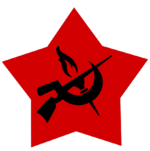 |
1931 - 1993 2001 - Present |
||
Communards |
 |
1931 - 1993 2001 - Present |
||
Aeterna Flamma |
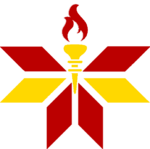 |
1942 - 1993 2001 - Present |
||
Liberatores |
1942 - 1993 2001 - Present |
|||
Aeterna Patria |
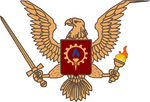 |
1942 - 1993 2001 - Present |
||
Coqs |
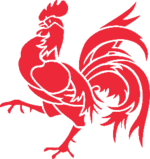 |
1942 - 1993 2001 - Present |
||
Enkontro |
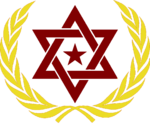 |
1952 - 1993 2001 - Present |
||
Copperheads |
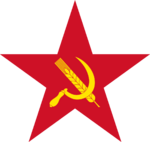 |
1961 - 1993 2001 - Present |
||
Spartakusbund |
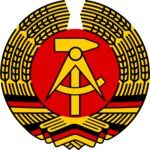 |
1961 - 1993 2001 - Present |
||
| Deactivated | ||||
Свет мира |
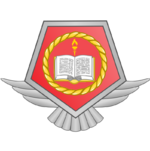 |
1931 - 1993 | ||
Све Бесплатно Ниско |
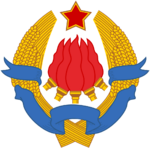 |
1931 - 1992 | ||
| 1952 - 1993 |
||||
| 1952 - 1993 |
||||
| 1952 - 1993 |
||||
| 1952 - 1993 |
||||
Brigade de Réuvières |
 |
1959 - 1974 | Briagde was completely destroyed during the Second Battle of Réuvières. | |